The clash between OpenAI and Robinhood over tokenized stocks has ignited a fierce debate about the future of financial innovation, investor access, and regulatory oversight. At the heart of the controversy lies Robinhood’s decision to offer tokenized stocks linked to private companies like OpenAI and SpaceX, and OpenAI’s swift rejection of any association with these offerings. This conflict underscores the tensions between democratizing investment opportunities and maintaining control over equity structures.
Robinhood’s initiative is part of a broader trend in financial technology aimed at expanding access to private markets. Traditionally, investments in private companies have been restricted to accredited investors and institutional players, creating a significant barrier for retail investors. By tokenizing stocks, Robinhood seeks to fractionalize ownership, allowing smaller investors to gain exposure to high-growth private companies. This approach is particularly relevant in Europe, where regulatory frameworks are more permissive of such innovations.
However, the tokenized stocks offered by Robinhood do not represent direct ownership of the underlying companies. Instead, they are derivative instruments linked to a Special Purpose Vehicle (SPV) that holds the actual assets. This structure introduces several complexities. For instance, token holders do not have the same shareholder rights as direct equity owners, raising questions about their ability to influence company decisions or benefit from dividends. Additionally, the lack of transparency surrounding the SPV’s operations and holdings can make it difficult for investors to assess the true value of their tokens.
OpenAI’s response to Robinhood’s offering was unequivocal: the company denied any partnership or approval of the tokenized stocks. This stance reflects OpenAI’s desire to maintain control over its equity and protect its brand from potential reputational risks. As a private company, OpenAI has the right to dictate who can own its shares and under what conditions. Allowing third parties to create derivative instruments based on its equity without consent could undermine its control and introduce unintended consequences.
Moreover, OpenAI may be concerned about the potential for investor confusion or fraud in the tokenized stock market. The market for these assets is still relatively new and lacks clear regulatory guidelines, making it vulnerable to manipulation and misinformation. By disavowing any connection to Robinhood’s offering, OpenAI is distancing itself from these risks and safeguarding its reputation.
The structure of Robinhood’s tokenized stock offering is a critical factor in the debate. The tokens are not direct shares but rather derivatives linked to an SPV. This introduces several risks for investors, including counterparty risk, regulatory uncertainty, and liquidity concerns. Counterparty risk arises from the possibility that Robinhood or the SPV may default on their obligations, potentially resulting in losses for token holders. Regulatory uncertainty stems from the evolving legal landscape surrounding tokenized assets, which could negatively impact the value of the tokens. Liquidity concerns are also a significant issue, as the market for these tokens may be limited, making it difficult to buy or sell them at a fair price.
The regulatory landscape for tokenized stocks is still taking shape, and the OpenAI-Robhood controversy has drawn the attention of regulators. Key questions include how tokenized stocks should be classified under existing securities laws, what disclosure requirements should apply, and how investors can be protected from fraud and manipulation. The answers to these questions will shape the future of the tokenized asset market. If regulators adopt a strict approach, it could stifle innovation and limit market growth. Conversely, if regulators fail to provide adequate oversight, it could increase risks for investors and undermine market confidence.
The OpenAI-Robhood spat highlights the complex and evolving nature of tokenized assets. While the promise of democratized access to private markets is appealing, investors must understand the risks and limitations of tokenized stocks. These tokens are not equivalent to owning actual shares in a company, and investors should carefully consider the underlying structure, regulatory environment, and potential risks before investing.
For companies like OpenAI, the decision to embrace or reject tokenization is a strategic one. While tokenization could unlock new sources of capital and broaden the investor base, it also raises concerns about control, reputation, and regulatory compliance. OpenAI’s decision to distance itself from Robinhood’s offering reflects its cautious approach to this emerging technology.
Ultimately, the future of tokenized stocks will depend on the ability of regulators, issuers, and platforms to address the risks and build a transparent and trustworthy market. Only then can tokenization deliver on its promise of democratizing access to investment opportunities and creating a more inclusive financial system. The battle between innovation and regulation continues, and the outcome will shape the future of finance for years to come.





